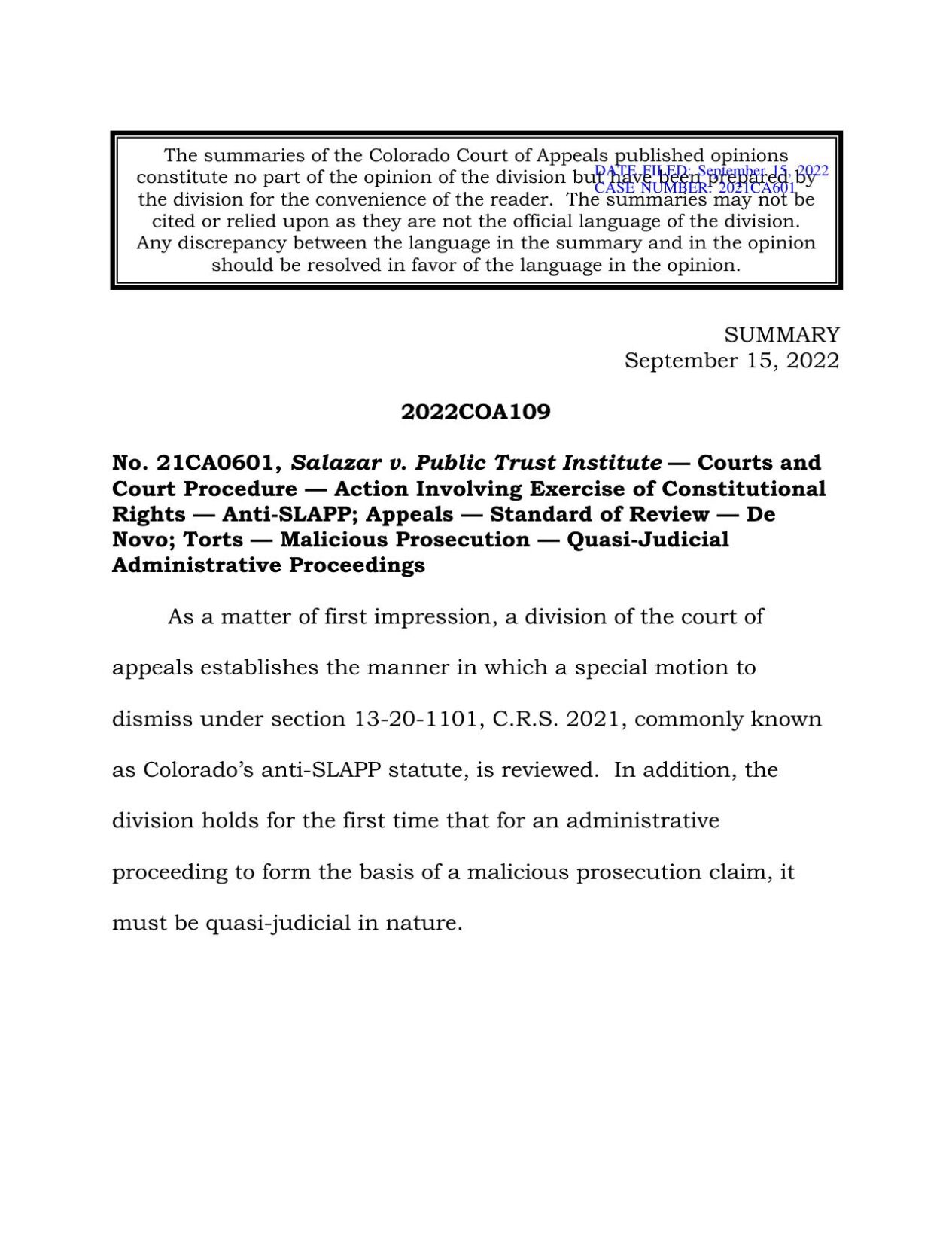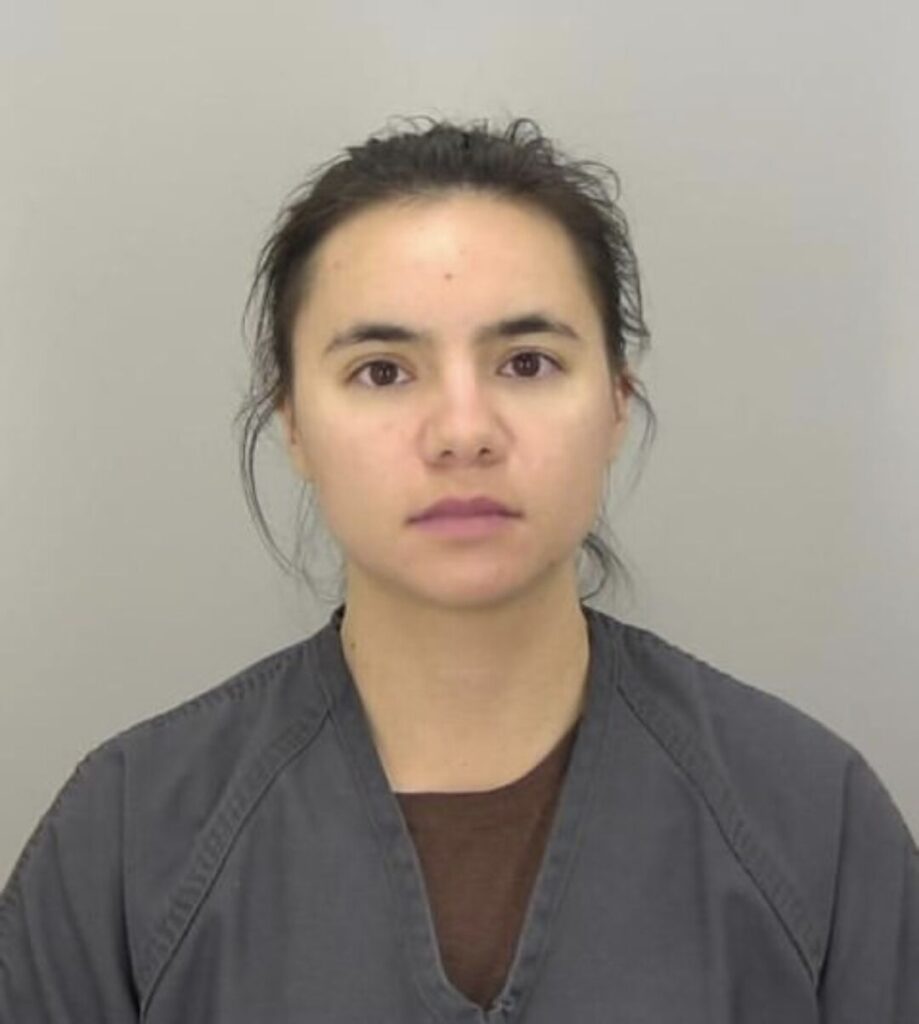Colorado appeals court says Joe Salazar’s lawsuit against Public Trust Institute can move forward

The Colorado Court of Appeals has ruled that a lawsuit by a former legislator alleging malicious prosecution by the Public Trust Institute and its former director can move forward.
The ruling came with a first-ever determination that an administrative proceeding, which could form the basis for a malicious prosecution claim, must be “quasi-judicial.” In this case, that applies to the Colorado Independent Ethics Commission and the Colorado Secretary of State’s elections division, which handles lobbying and other complaints.
What led to the lawsuit were complaints that Suzanne Staiert and PTI filed with both the Secretary of State’s office and the Colorado Independent Ethics Commission. The complaint with the Secretary of State alleged Joe Salazar, who served three terms in the Colorado House but decided in 2018 to run for Attorney General, engaged in lobbying in 2019 without registering as a lobbyist. The ethics complaint claimed Salazar violated a provision in Amendment 41, the state ethics law, that bans former lawmakers from lobbying for two years after they leave office.
After losing the primary for Attorney General, Salazar took a job as executive director of Colorado Rising, an environmental advocacy group, in January 2019.
Immediately upon filing the complaints, PTI and Staiert issued a news release, alleging Salazar engaged in unethical conduct.
Salazar’s lawyers countered that the actions were meant to harass and humiliate their client.
“Defendants did not have an honest belief at the time the administrative complaints were filed that Salazar had violated Colorado lobbying laws, but instead had another motive for filing, namely, to harass and humiliate Salazar by spreading the news about the complaints as widely as possible,” Salazar’s attorneys wrote in a brief filed last October.
Salazar had held several press conferences in 2019 at the state Capitol, including one in which he asked supporters to contact lawmakers about Senate Bill 19-181, the bill that revamped the mission and membership of the Colorado Oil and Gas Conservation Commission.
PTI also pointed to an email Salazar sent from his law firm email address in August 2019, in which he urged lawmakers to address immigration reform. The General Assembly was not in session at the time; hence, it did not have a bill on that issue pending.
The Secretary of State’s Office, after an investigation, dismissed the complaint filed with that office; the ethics commission did the same in December 2020.
In the lawsuit, Salazar alleged that Staiert, a former deputy secretary of state, had ruled on similar circumstances while working for the government office. While she was deputy secretary of state, Staiert authored two advisory opinions dismissing lobbying complaints, one involving the American Lands Council of Utah. In the ALC complaint, Staiert ruled that the group’s email to the public, defined as “grassroots lobbying” were “sufficiently minimal” to avoid a violation of Colorado’s lobbying laws.
PTI and Staiert didn’t filed a response when the Elections Division filed a motion to dismiss; with the IEC, they agreed that three of the four claims did not fit within the statutory definition of lobbying. The fourth was dismissed because PTI and Staiert failed to allege a violation of law.
In response to Salazar’s lawsuit in Denver District Court, PTI and Staiert invoked a new state law, known as SLAPP (Strategic Lawsuit Against Public Participation) that set up an expedited process for reviewing the lawsuit.
The district court ruled that Salazar had a reasonable likelihood of prevailing in this lawsuit.
PTI and Staiert appealed to the state Court of Appeals, arguing Salazar did not respond to the defendants’ argument that both the state Constitution and “Colorado common law” require him to prove Staiert said something false.
Attorney Daniel Burrows, representing PTI and Staiert, in his November 2021 brief, said the First Amendment requires “actual malice” – “clear evidence that the defendant made a false statement of fact, either knowing it to be false or in reckless disregard thereof – before liability may attach in a case brought by a public figure” like Salazar.
In response to the American Lands decision, Burrows pointed out that Staiert rejected the complaint because “there was no evidence that the person complained of was actually paid – a clear requirement of the Colorado Sunshine Law,” nor was the email directed to lawmakers.
In their ruling, the Court of Appeals noted the argument by Staiert that a malicious prosecution claim cannot be based on truthful complaints to governmental investigators, that the First Amendment requires Salazar’s claim to be dismissed and that the administrative proceedings of the Secretary of State were “insufficient to support a malicious prosecution claim.”
The court rejected the first two arguments but agreed with the third.
Regarding the SLAPP law, the court’s ruling pointed out that a “special motion to dismiss” filed by Staiert was based on the assertion that Salazar would lose. The ruling stated the anti-SLAPP motion is similar to a request for injunctive relief and resolution is based on whether the plaintiff can demonstrate a reasonable likelihood of success, which the appellate court ruled was likely.
“Although the factual allegations may have been truthful,” the ruling said, “there is a reasonable likelihood that Salazar will be able to demonstrate that Staiert knew those facts did not add up to a violation of the law.”
The ruling also said Salazar demonstrated a “reasonable likelihood of proving that Staiert had an improper objective in filing the complaints” because she knew they lacked a legal basis.
The district court also said the complaints accused Salazar of violating the state lobbying laws in the face of contrary advisory decisions, some of which were drafted by Staiert when she was deputy secretary of state.
As to the quasi-judicial proceedings, the appeals court ruled that because the complaint filed with the Secretary of State never made it past the investigation phase, those proceedings were not quasi-judicial and as a result cannot support a claim for malicious prosecution. However, the IEC complaints went through the entire process, and will form the basis for the lawsuit going forward.
The appeals court ordered the case remanded back to the district court for further proceedings.
The Colorado Court of Appeals ruling in a lawsuit filed by former state Rep. Joe Salazar against the Public Trust Institute and its former executive director, Suzanne Staiert.














